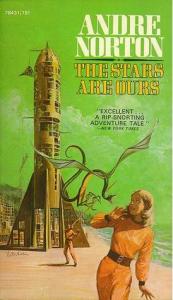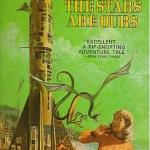 The Stars are Ours was a set of slogans for life in the 1960’s if you wanted to do engineering and not drop out and drop acid. At the very end of the book, the hero looked into the future as heroes of a certain kind of book do:
The Stars are Ours was a set of slogans for life in the 1960’s if you wanted to do engineering and not drop out and drop acid. At the very end of the book, the hero looked into the future as heroes of a certain kind of book do:
Dard’s eyes were on the painted cliffs but inwardly he saw beyond—across the wide and waiting land. Alliance with the merpeople—taming of the land—building a new civilization—his breath came faster. Why a lifetime was not going to be time enough to do everything that even he could see had to be done. Could their breed be defeated? He gave his answer to the uncertain future with a single word: “NO!”*
The stars are ours or so the book told me. The title stuck with me more than the story, this book that I read long, long ago as a preteen at childhood’s end.
As some fun Christmas reading, I dug up a copy and realized three things. This is better than average Golden Age science fiction, but that was not saying much. Golden Age science fiction is worse than I recalled. ( What will happen if I take a second look at Isaac Asimov?) Second, secularism has changed from my childhood in two ways that are important to understanding our present. Finally, a woman’s voice matters everywhere.
The cover was dated when I read it, now it is cringe inducing. Andre Alice Norton was a woman who refused to let men have all the Golden Age nerd fun. You were a fan when you knew Andre Norton had done an Eowyn: she was no man. Her fantasy is better than her science fiction and if you do not over expect, there are good times to be had.
What happened to the old secularism? From Scientism ad Astra to Fearful Fantasy?
The old secularism in American from (about) 1900 to (about) 1970 was optimistic, humanistic, and scientistic.
Anyone reading science fiction in the Golden Age** got our optimism, humanism, and scientism straight up. In fact, popular secularism was often just a confident scientism challenging us to go to the stars. Golden Age science fiction writers were the prophets of the coming new age of Science. Humans, if they were rational (scientists!), could not be stopped. We had moxie: ad astra.
We actually made it to the moon, but then secularism changed. You can see this in our interest in engineering and NASA. We do not tell tales glorifying engineering feats so much anymore. The stars are ours on handheld devices and not because NASA is going to give us warp drive.
The old secularism saw NASA and said: ad Astra! Reagan was the last President (in tension with his sincere Christian faith) who also knew the lure of the old secularism in his bones. He wanted to go back to the moon and Mars. Star Wars? Of course scientists, American scientists, could give us a defense against Soviet missiles. What disease could they not cure?
To the extent Reagan was a Christian humanist, he picked an enduring tradition; to the extent he was influenced by the old secularism, he was out of date.
Reagan was not perfect, influenced, like all of us, by the popular prejudices of his time. One such prejudice picked up was the old secularism. Like many smart young people, Reagan found science fiction as an intellectual outlet. From his childhood right through his time as governor of California, science was going to produce (in the words of Disneyland’s Tomorrow Land) a “great big beautiful tomorrow” in a continuous carousel of progress.
The echoes of the early science fiction he read were old fashioned and hopelessly dated. He was fortune in his foes as the Soviets also were trapped in a mid-twentieth century scientism even more than Reagan. The President of the United States had his faith to help him. The poor commissars really suspected that (ad Astra!) if the Americans wanted to build “Star Wars” they just might.
Scientism was the Proposed Solution and the Problem
Sadly, scientism undermined the joint right-left support for science and engineering. By making science the highest good, there was an unchecked aristocracy that could become quite inhuman. Science and mathematics are hard and only an elite can do both at a high level. The training requires an almost monastic discipline and can leave little time for other disciplines.
The rigor is paralleled in the arts and humanities, but the arts and humanities lost social prestige under scientism. Specialization in every field led to a failure for disciplines to listen to each other. Scientism wanted to give “science” the ruling role theology had once held in the university, but science lacked the breadth to fill the role.
The humanities too often responded by becoming soft (not real) sciences or by attacking objective science itself (some forms of postmodernism). The rigors of philosophy, literature, and languages were not science, but they were needful to science.
The old secularism, especially the scientism, alienated people who should have been allies. A Walt Disney was an ally of the old secularism. Later artists, filmmakers, and creatives outside of science, found the old secularism demeaning and incoherent. Engineers build roads and pumped water from the Colorado to Los Angeles in brilliant engineering works, but they could not ground these accomplishments in ethics or an adequately human worldview.
The great big beautiful tomorrow was filing the ocean with plastic.
Part II is here.
—————————————
*Andre Norton, The Stars are Ours, Kindle edition.
**I fell into scientism for a time. The books were “old fashioned” by the time I read them, but I loved them. Star Trek in reruns kept the old secularism going for me.












